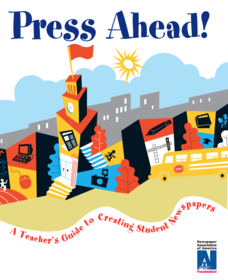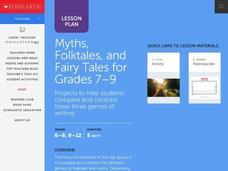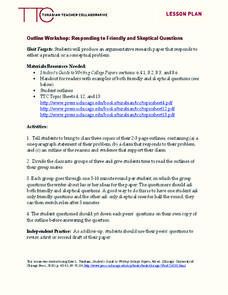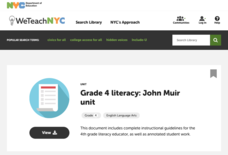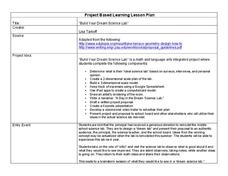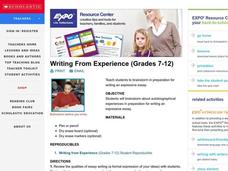ReadWriteThink
A Picture's Worth a Thousand Words: From Image to Detailed Narrative
A picture's worth a thousand words—and even more inspiration! A visual activity uses photographs to inspire writers. The process teaches aspects of narrative writing, such as point of view and characterization.
Newspaper Association of America
Press Ahead!
Give class members some great news! A media unit teaches individuals about ethics, parts of a newspaper, business writing, photojournalism, and more topics that have to do with the press. Full of material for a variety of learners,...
University of North Carolina
Anthropology
Anthropologists ask the question that everyone wants answered: what does it mean to be human? An online handout provides a brief introduction to the study of anthropology and outlines three common types of anthropology writing...
Scholastic
Myths, Folktales, & Fairy Tales for Grades 7-9
Here is a must-have resource for studying fairy tales, myths, and folktales with your class! It includes instructional ideas, activities, and materials to support a month-long review of these three unique genres of writing.
Curated OER
Maniac Magee: Found Poem
Instruct your readers to scrounge through the pages of Maniac Magee in search for descriptive passages or words they may use to write poetry. As they look for meaningful, sensory descriptors in Jerry Spinelli's novel, readers...
California Education Partners
Quest for Tree Kangaroo
A three-day assessment challenges scholars to read a passage from an informational text then complete two activities that lead to a writing assignment. Day one and two begin as readers independently read a passage and tag the most...
Turabian Teacher Collaborative
Outline Workshop: Responding to Friendly and Skeptical Questions
Answering questions is the best way to hone and revise your argument. Foster receptive writers with a workshop activity that promotes peer editing and argumentative writing skills. Given lists of both friendly and skeptical...
Poetry4kids
Rhythm in Poetry: More Than Two Feet
Want to put some feet in your head? Check out an online lesson about spondees, dactyls, and anapests to bring new structure to your poetic forms.
New York City Department of Education
Grade 4 Literacy: John Muir Unit
Learn how to correctly analyze and score a written performance task. Example work shows annotated think alouds for grading. Teachers also have access to graphic organizers for helping writers succeed,
Curated OER
Build Your Dream Science Lab
Would your ideal science lab be filled with bubbling beakers and zapping Tesla coils? Or would it contain state-of-the-art computer technology and data analysis? Dream big with an innovative lesson that connects math and language...
Anti-Defamation League
10 Ideas for Teaching Black History Month
Celebrate Black History Month with the help of 10 ideas that delve deep into the history, major events, contributions, famous African Americans, and sheds light on how scholars today can take a proactive stance on current civil rights...
Gourmet Curriculum Press
Author's Purpose
Who knew determining author's purpose could be turned into a game? Four teams compete to correctly identify the author's purpose for writing a series of passages.
Edutopia
Empathy
Teach your learners about support, respect, and listening skills with an activity about empathy. Class members set goals for themselves regarding their peer relationships, and monitor their own progress over a period of time.
Orlando Shakes
Julius Caesar: Study Guide
What makes a good leader? Use the curriculum guide for William Shakespeare's Julius Caesar to help scholars answer that question. Pupils research the play's historical context and other background information before engaging in...
PBS
Before We Travel, We Research
Context is key when it comes to historical research. Prior to field research, class members learn as much as they can about the site they are going to visit. Groups investigate and prepare presentations about the history of the site, the...
Curated OER
Picture Writing Prompt
In this picture prompt worksheet, students look at a picture and try to imagine what is being said, where people are going or have come from and choose a character to write a story about.
Curated OER
Helping Others
Students explore community service. In this character development and community lesson, students sing a song based on the fable The Lion and the Mouse. Students participate in a discussion about kindness, and generate ideas for...
Curated OER
Revision Lesson
Students, through a series of 4 lessons, explore what it means to revise their written work. They revise a bland story together and then practice revising their own papers by identifying the main action and "exploding" that moment into...
Curated OER
Back to School Writing
Learners compile a daily journal to improve their writing skills. In this writing skills lesson, students use a picture to help them write on a daily basis. Learners write reflectively each day to improve their writing skills.
Curated OER
Writing Letters
Students see the difference between business letters and other letters that could be received in the mail, such as bills, invitations, and letters from friends or relatives. They practice writing letters as well as sending them.
Curated OER
Writing From Experience (Grades 7-12)
Students brainstorm in preparation for writing an expressive essay. They review their responses to 'Writing from Experience' and write notes and brainstorm other ideas or details for their essays. They take turns illustrating their life...
Curated OER
What Can We Do to Help Others?
Students explore the concept of philanthropy. In this service learning activity, students select local nonprofit organizations that may benefit from their service. Students welcome a spokesperson from a local organization speaking about...
Curated OER
Narrative Writing
Students complete activities to learn narrative writing. In this narrative writing lesson students are given writing prompts in order to better understand how to write in a narrative format.
Curated OER
Factual writing: leaflets
Students identify persuasive words in provided leaflets. In this factual writing activity, students complete an online activity. A worksheet is provided for extra practice.

